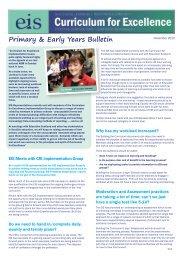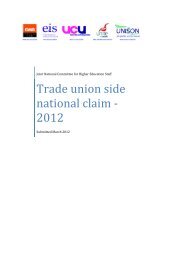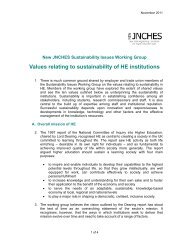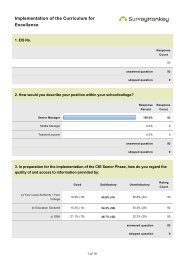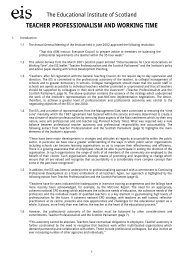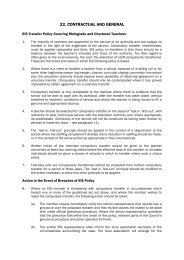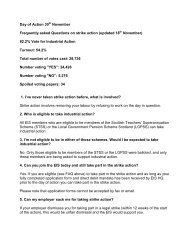Download EIS Reps Handbook
Download EIS Reps Handbook
Download EIS Reps Handbook
Create successful ePaper yourself
Turn your PDF publications into a flip-book with our unique Google optimized e-Paper software.
The Institute is of the view that teachers who will not be able to retire at age 60 on fullbenefits (that is with 40 or more years of service) should give serious consideration asearly as possible in their careers to improving their retirement benefits by makingadditional pension arrangements. Before coming to a decision as to which course of actionto follow you should seek financial advice.To provide such advice, the Institute has formed a company in conjunction with a firm ofinsurance brokers. Members are urged to make arrangements through them to discuss thewhole matter of pension provision. <strong>EIS</strong> Financial Services can be contacted on 0141 3328004 or at 6 Clairmont Gardens, Glasgow, G3 7LW or e-mail enquiries@eisfs.co.uk. Youcan also discuss this matter with any independent financial adviser of your choice.Can I improve my retirement benefits?Yes, you have a choice of four ways of topping up your retirement benefits:1. purchase of Additional Pension Benefits (APB) in the STSS;2. payment of AVCs to Prudential under the special AVC arrangements for teachers;3. payment of FSAVCs to a provider of such contracts;4. payment into a Stakeholder Pension Plan.What are the advantages of an AVC contract?An AVC contract (either with an outside provider or with the Prudential) offers flexibility inthat although it is principally for the purpose of improving personal retirement benefits,part of the contribution may be diverted to provide additional cover for your dependants,should you die in service, either by way of a lump sum and/or pension benefit. AVCcontracts also offer the flexibility of varying the contributions paid as you may increase,decrease or even discontinue them as your circumstances change. These contributionsalso attract tax relief and the funds in which they are invested under the AVC contract arealso free of all UK income and capital gains taxes.There is, however, the disadvantage that benefits arising from AVC contracts are notguaranteed but are instead dependent on the success of the investment medium chosenand interest rates at the time of retirement. The accumulated funds must be converted intoa taxable annual benefit by the purchase of an annuity. An AVC contract cannot, therefore,provide a tax-free lump sum on retirement although you can now receive 25% of the fundvalue as a tax-free lump sum. Over recent years, real returns have, however, been obtainedon investments, and while past performance is not necessarily a good guide to the future,this makes an AVC contract an attractive option for those teachers relatively close toretirement.What is the difference between an FSAVC contract and an STSS AVC contract with thePrudential?Essentially the contracts are the same in that they are both money purchase contracts withbenefits dependent on investment returns up to retirement and annuity rates atretirement. Contributions under both contracts attract income tax relief and can be variedaccording to your circumstances.One difference between the contracts is the greater flexibility of the FSAVC contract inallowing benefits to be drawn before benefits are drawn from the STSS provided that theteacher is aged at least 50 and is no longer contributing to the STSS. Benefits from anSTSS AVC contract with the Prudential can, however, only be drawn from the date fromwhich benefits are drawn from the STSS.95September 2012





